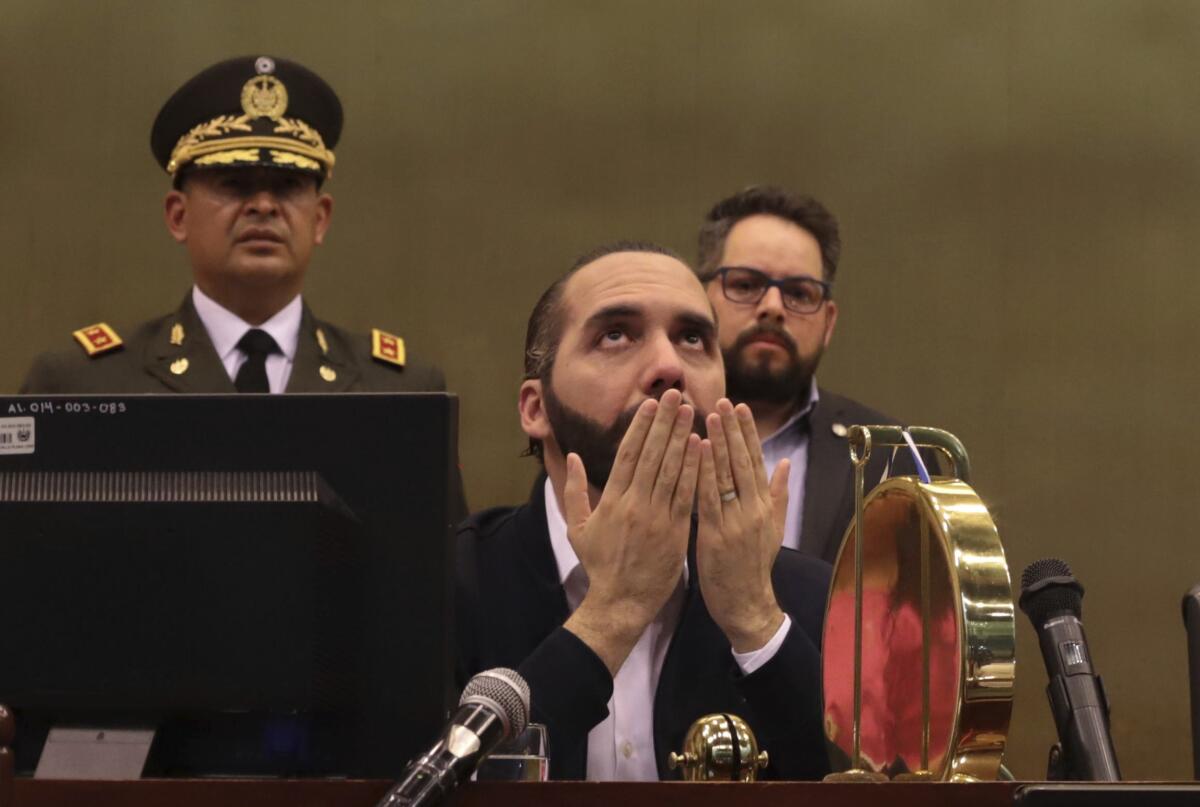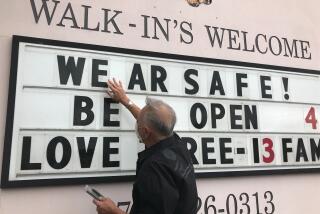The U.S. approved a $2-trillion coronavirus relief package. Other nations are trying their own aid plans

- Share via
U.S. officials drew a lot of attention recently when they approved a $2-trillion relief package to help people face economic challenges tied to the coronavirus, but also said it would not be enough to fend off mounting unemployment.
Additional help is needed, officials agree, but what form it takes and when it might be available remained undetermined as of Wednesday. The original relief package includes $1,200 payments for millions of residents, along with provisions for small and large companies struggling to stay afloat.
In some cases, local or state governments are also offering various forms of relief. Through an executive order, for instance, California Gov. Gavin Newsom issued a two-month delay on residential evictions for tenants who can’t pay their rent. Californians will also not have their water turned off due to unpaid bills, and governors in several other states, including Michigan and North Carolina, have enacted similar policies.
Other countries have also been trying to come up with plans to get through the economic havoc caused by COVID-19. Here is a sampling of what some of them are doing.
El Salvador
El Salvador instituted a mandatory 30-day quarantine, enforced by soldiers and police officers.
Then, President Nayib Bukele‘s administration suspended water, electricity, telephone, cable and internet bills for three months. It also established a fund for “micro, small and medium” businesses that includes payroll subsidies and froze credit card bills, mortgage loans and retailers’ rent payments for the same period. The government also promised $300 a month to its most vulnerable families.
The small nation’s response to the outbreak made international headlines. For weeks, Bukele’s action was lauded as an example to follow. The Grammy Award-winning rapper Residente included Bukele among the current and former officials in the Americas he’s been interviewing about the pandemic.
Then things went awry. After the website for potential beneficiaries crashed in late March, thousands of desperate citizens broke the quarantine to inquire about the money in person.
Since then, the site has been repaired and, according to the Bukele administration, more than 1 million families had received the $300 payment as of early this week. Members of the Health Ministry, national police and the military keep crowds from congregating at banks and take people’s temperatures before they go inside.
Despite the apparent success of the measures, critics have raised concerns about the nation’s economy in the long term. Because El Salvador took out a $389-million emergency loan from the International Monetary Fund to deal with COVID-19, they worry that the country will be seriously indebted once the health crisis is over.
Last week, the president extended the quarantine by 15 days, meaning that the lockdown is expected to continue at least until early May. The country had 159 confirmed infections and six deaths as of Wednesday.
South Africa
South Africa, the most industrialized country on the African continent, was struggling financially before the pandemic was declared. About half its citizens live below the national poverty line, and poverty continues to be concentrated in regions where black South Africans lived under apartheid. Shortly before the nation went into lockdown on March 27 — also enforced by the military and police — the unemployment rate hovered at nearly 30%.
That same day, the country received a sub-investment grade by Moody’s Investors Service, marking South Africa as a bad investment with a high risk of default.
“The decision by Moody’s could not have come at a worse time,” South African Minister of Finance Tito Mboweni said in a statement, noting that investors had already been leaving the country.
To stem economic fallout, the Ministry of Finance on March 29 began granting employer tax subsidies for four months. The Department of Small Business Development is supplying rental and payroll relief.
Also, because tourism has plummeted, the government made grants of up to about $2,600 available to small businesses in the tourist industry. Other low-interest loans, which go up to about $268,000, are specifically geared at South African-owned businesses making products to combat COVID-19, such as hand sanitizer, steel beds for hospitals, hand soap and face masks.
Additionally, some $10.6 million will be used to provide interest-free loans to black entrepreneurs who make healthcare products. Companies that produce staples such as flour, fruits and vegetables, milk, baby food and cooking oil can also apply for relief.
“With the downgrade, imports are going to be very expensive, so we need to start to produce locally,” Minister of Small Business Development Khumbudzo Ntshavheni explained in an interview with a local radio station.
South Korea
South Korea, having taken early and aggressive measures to control a local outbreak, hasn’t had to impose widespread business closures and shelter-in-place orders like other countries. Even so, the country’s already flagging economy, which is heavily reliant on exports and closely linked to China’s, has been hard hit from the beginning of the year with the impact of supply-chain disruptions and travel bans.
To cushion the blow, the South Korean government has announced plans to issue emergency relief funds of about $800 for a family of four to households with income levels in the bottom 70%. Families with children 6 or younger will receive an additional $300 per child.
South Korea has also said it will spend upward of $100 billion to stabilize financial markets and assist businesses ranging from mom-and-pop stores to large corporations, by providing emergency loans, rescue packages and deferments in insurance premiums. The government is also rewarding commercial landlords who give tenants temporary cuts on rent by compensating for 50% of the discounted rent in tax breaks for the first half of 2020.
At the same time, the country has relaxed standards on who can apply for public assistance, allowing freelancers and those who are self-employed to obtain welfare funds if their work has been drastically cut since the virus outbreak.
France
On March 17, the French government announced a nationwide lockdown banning all public gatherings and forcing residents to remain indoors, except for essential tasks such as grocery shopping. Soon after, President Emmanuel Macron signed an ordinance barring the interruption of electricity, gas and water services for small businesses.
Under this measure, utility companies will issue their invoices over time once the country overcomes the health crisis. Distressed companies are not to be penalized or charged any fees in the interim.
Macron’s ordinance also allows small businesses to postpone or suspend their rent payments. These benefits do not extend to average citizens, but financial aid is available for tenants on a case-by-case basis.
France is also providing state-guaranteed loans for businesses of all sizes and has set aside about $1.3 billion for “solidarity funds” to support small businesses, self-employed people and freelancers. These funds can provide up to $3,820 per company or individual.
Government officials have said the pandemic is expected to plunge the country into recession. To help those already struggling to make ends meet, the government allocated about $54 million to help the homeless population.
Portugal
After declaring a state of emergency March 18 that enables Portugal’s government to deploy the army for security purposes, Finance Minister Mário Centeno said late last month that the country ended 2019 with a solid economy that would allow its citizens to face the pandemic with confidence.
The country’s minister of state, economy and digital transition, Pedro Siza Vieira, however, signaled that the closure of commercial and service establishments, along with the decrease in international and domestic travel, was “having a major negative impact on our companies.”
As a result, the government began several measures to protect businesses and workers. These include covering some employee wages for up to three months. Officials are authorized to allocate upward of $14 billion in state-guaranteed loans for businesses.
Portugal has more relief plans in the works. The Council of Ministers, for instance, approved a measure that aims to provide loans for people struggling to make rent.
Times digital editor Agnus Dei Farrant contributed to this report.
More to Read
Sign up for Essential California
The most important California stories and recommendations in your inbox every morning.
You may occasionally receive promotional content from the Los Angeles Times.












